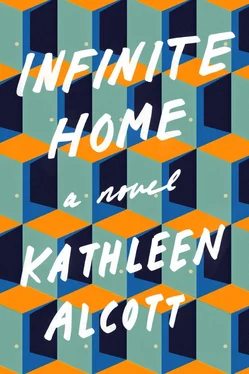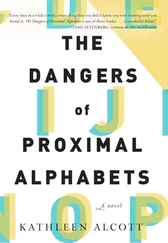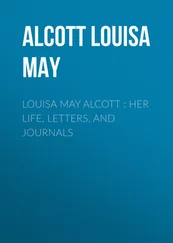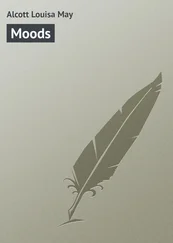“You could hear a bug cough.”
“Exactly. So maybe it is our job as friends to be extra nice to Edward, even when he is acting slightly like a monster.”
“Like a fucky monster made of gangrene who is rotting all over everyone.”
Laughing into her brother’s hair, Claudia brought one leg to touch the ground, guiding the hammock into a sway that was slow and even, and soon they found a sleep that seemed to promise something as they fell into it, a cleaning of the body or an adjusting of the mind.

IN THE TAXI Edith dismissed the congestion of cars with a fluttery hand.
“It’s always like this Christmas weekend.” The man behind the wheel narrowed his eyes in the rearview mirror, poised to correct her mistake, but saw something in the impotent way she poured her sight out the window, and stopped.
Adeleine kept her eyes closed and her right hand fixed on the door handle. The driver spoke in a sonorous voice into a Bluetooth earpiece, his syllables so attenuated they seemed coded. Outside the speeding taxi one borough rushed into another, Brooklyn finally replaced by the low plastic-sided houses and dim restaurants and suspect quiet of Queens.
“Declan says it’s important to dress to the nines when you’re flying. He says, if you can’t show your best self when defying man’s God-given abilities, then when? It’s a crime to cruise the heavens in anything but your finest suit, because what would St. Peter say about blue jeans? He might send you to hell to change!”
Adeleine’s body sank lower and lower, like litter discarded in a bay searching for its resting point. Eventually her knees on the back of the seat were set higher than her cheeks, and pieces of hair moved above her on the upholstery, held hostage by static.
“You know, we took Jenny on a plane. Seven months she was. And some friends of mine, they said, what are you thinking, babies should stay safe at home where they belong. And Declan said, nope, our girl’s a flyer, I know it. I dressed her in a little corduroy jumper and she stood on my lap, tensing and untensing her toes. We were by the window and Declan said, better keep the shade down, she’ll be calmer that way. But she kept reaching for it. She wanted that thing open! She wanted to see where we were! Once I pulled it up she was glued to that patch of blue, would not look away for anything. There was another baby on the flight and it cried like it was starved, and when it would start up wailing, Jenny would stiffen and blink, like she recognized the sound but couldn’t remember from where, and then turn back to the business of cloud watching. She’d forgotten everything else, didn’t care if we never landed, couldn’t imagine any other place.”
Adeleine’s fingers darted and groped for the window button. She turned her face into the rushing air and arched her shoulders, but her vomit only made it as far as the back windshield, and Edith began to shriek.
“Sir! A young lady has just become ill in the back of your cab! Do something at once!” For the duration of the ride, the driver muttered hard consonants in Gujarati, then some of the profane variety in English. As they careened into the airport under the brash white signs of different airlines, their suitcases shifted audibly in the trunk, and the crepuscular sky fought viciously to keep its color, the violets and blues now thin and strained.

RELIEVED OF THE QUESTIONS that had propelled him, Thomas tried to restore his lost sense of purpose by familiarizing himself with the mechanics of Edith’s final home. He followed one of Song’s sons, Wallace, a tall man with a lopsided smile and prominent canines, on his rounds. He watched as Wallace affectionately chucked the red throat of a hen, then lifted the bird to retrieve her eggs; as he culled worn sheets from various beds and placed them inside a frail washing machine that sat on the outskirts of the main circle of buildings, alone and painted blue; as he scooped out cat food into a series of wooden bowls with the patience of a priest, and tugged the tips of tails as the felines appeared, one by one, to circle his feet.
Thomas had intended to sit with Wallace during the evening hour in which people spoke, to ask him plainly whether these routines, this place, gave him happiness, but it was evident even in the way the man walked, turning his head frequently to survey the bounty: the familiar faces napping in hanging chairs, the untamed sun-washed herb garden, the one-room homes built for simple lives, the well-worn paths that led to water.
Wallace, tasked with building a bed for Edith, set up on the porch of Song’s little house, and Thomas helped as best as he could. For two consecutive afternoons, he handed Wallace the lengths of wood and tools at which he pointed, offered encouraging grunts, fetched pitchers of water and plates of steaming polenta from the communal kitchen. When the work was done, Wallace led Thomas to a squat tin-roofed shed, pointed to a row of dusty paint cans, and opened his arms wide in invitation. Pleased to be handed this small authority, Thomas selected a pale yellow, and Wallace squeezed his shoulder and left him to it.
He spent the rest of the sunlight close to the wood, passing the brush repeatedly over bubbles that formed in the color, stepping back into the garden to appraise the thing from a distance as slat by slat, spindle by spindle, it began to glow.

AS HE PASSED the edge of the campground, the ranger’s hut and the silver-haired woman in her khaki uniform, Edward waved and kept running. He needed to reach the concrete highway, to get out from the cover of trees; he wanted the sun to burn off the shame he felt for snapping at Paulie, and to feel the man-made surface fixed underneath him as he moved.
He had not expected that leaving New York would feel somehow like going without food, that watching Paulie and Claudia day in and day out would primarily serve to prod at old losses, as a reminder of the family he didn’t have. He didn’t have his mother, who had spent the last years of her life wheezing in the glow of unsolved murder reenactments; he didn’t have his father, who had regarded his sons as poor returns on investment and squinted at them, waiting for their value to rise. He certainly didn’t have his brother, who had finally buckled under their mother’s neurotic legacy: he had begun coming home from his insurance job, locking three deadbolts, ignoring most phone calls, and showering with bleach.
Once, he’d had Helena, but couldn’t understand that romantic commitment was, contrary to myth, built on the conditional, a rolling system that noted each person’s deficiencies until they congealed into the untenable. He had gone to great lengths to test the limits of her love, and dared her to fail, and then she had.
The details of it came back to walk with him sometimes: how he had turned, on so many nights, towards the wall, and let her sleep alone on a wide expanse of bed; how she had begged him to open and to excavate, and he had snorted at her self-help speak and dismissed her genuine efforts as affect. Even on the morning she’d gathered her last small things — a wooden box of seldom-worn jewelry, a stainless steel pepper shaker — she’d appealed to him. Standing in the doorframe with the items in her hands, she’d said, “You know, I would go on putting your life ahead of mine forever, probably, if you gave the slightest indication that was truly what you wanted.” He hadn’t even glanced up from where he’d been lying on the couch — he’d known how she would look, her skin impassioned with uneven color, her hair pinned back to mirror the severity of her face — until he saw her shadow move and knew she was finally gone.
Читать дальше













